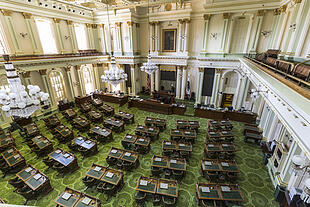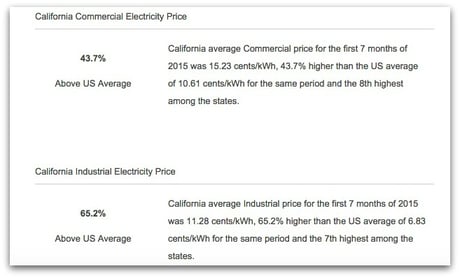 California's SB350 May Be a "Job Killer" and Hurt Businesses
California's SB350 May Be a "Job Killer" and Hurt Businesses
This new law, signed by California Governor Brown on October 7, 2015, adds significantly to energy use standards already on the books. The economic impact will be harsh for California labor. Law supporters, on the other hand, are celebrating the fact that California businesses and residents are now required to generate half of its electricity from renewable sources such as solar and wind by 2030.
At the same time, the state will need to double energy efficiency in homes, offices and factories.
While the state's new target for renewable energy use is expected to stimulate the development of more solar and wind power plant, it will also create troublesome challenges since renewable energy sources can be unreliable - i.e., it's not always possible to predict when the sun will shine or the wind will blow.
New Technology Initiatives Offered as a Balance to Business Loss
Energy experts agree that California will need to invest in energy storage technology and other initiatives in order to ensure that sufficient supplies of electricity are available when it's needed.
“We have absolutely no doubt that we'll be able to get there,” said Geisha Williams, president of electric operations at Pacific Gas & Electric. “We have a real opportunity to create a model that other states and nations can follow.”
Nonetheless, Williams said it's possible that the legislation could end up boosting electricity rates. Supporters of the new law claim that renewable energy prices are dropping and that the new efficiency targets would help keep energy bills stable overall.
One of the central requirements is that California will need to become twice as energy efficient by 2030 under the new law. For existing buildings, that could include investing in newer appliances or upgrading existing heating and air conditioning systems.
Energy Efficiency and Increased Business Costs
According to Andrew McAllister, of the California Energy Commission, older apartment buildings would be particularly challenging.
“What we're trying to do is facilitate, where necessary, the marketplace for energy efficiency, for building upgrades, for remodels,” he said.
The original bill also called for mandatory reduction in vehicle fuel use by 50 percent. This was strongly opposed and eventually dropped from the final version of the law. However, Governor Brown has said that he plans to use his executive power to try to make this happen. Since much of his authority rests with the California Air Resources Board (CARB), a state regulatory agency, there is a great deal of controversy regarding the extent of governmental coercion that could be imposed.
The new law authorizes the California Air Resources Board to use a wide range of methods such as new rules, regulation, orders, emission limitations, emissions reduction measures, or market-based compliance mechanisms, to achieve the statewide target.
Negligible Climate Impact Over Current Economic Concerns?
Critics warned that the bill would only serve to halt business development and increase the costs of already-rising electricity, gasoline and other products. A study by the Los Angeles County Economic Development Corporation, stated that potential problems from the reduction will arise both in the oil industry and in related manufacturing and transportation sectors. The study claims that these regulations threaten 11 percent of the state's jobs and more than 14 percent of its GDP.
Other critics of the law warn of more land-use controls similar to existing requirements where the state limits the ability of local governments to allow developments that are not high density. It's believed that the goal is to coerce Californians into smaller homes and to make more use of public transit systems, such as light-rail lines and eventually high-speed rail.
California Senator Bob Huff issued the following statement in response to SB 350:
“The goals of this legislation are noble, but at what point does being on the leading edge of environmental reforms impact our ability to create jobs? Electricity costs in California are already 50 percent higher than most other states, which is one reason why so many jobs have moved to Texas or elsewhere. SB 350 will increase the cost of doing business in California, when we already have some of the highest taxes in the nation and an increasingly burdensome regulatory structure. It puts California business at a competitive disadvantage by increasing costs and will make it harder for them to compete with out-of-state businesses.”
State Assemblyman Jim Patterson has said that Senate Bill 350 will increase the cost of electricity, run more businesses out of our state, damage the reliability of our power grid and with no noticeable impact on our environment.
What California Businesses Currently Pay for Electricity

Increased Living Costs May Decrease Discretionary Income
A looming concern with the new legislation requirements is the impact on lower income residents. Many poor and middle-class workers drive older cars and can't afford to buy new electric vehicles, which will be required over time. To address this issue, CARB plans to provide highly subsidized hybrids to lower-income people.
If you have questions regarding this, or other HR issues and practices, let us help you in managing your HR needs, payroll processes, and staying on top of compliance demands. Get your Free Download: Payroll Outsourcing Guide to help you make an informed decision or call Accuchex Payroll Management Services at 877-422-2824.


 California's SB350 May Be a "Job Killer" and Hurt Businesses
California's SB350 May Be a "Job Killer" and Hurt Businesses